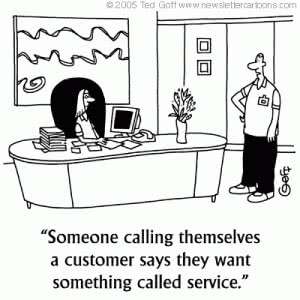Customer Service
Customer Service Must Be a Deliberate Strategy

I had a conversation the other day with a senior executive at a company for which I occasionally do some consulting. The executive wanted my opinion on how his company handles warranty returns. Under their current practice, they oblige their customers to remove the faulty equipment, which is often tightly embedded in an operational environment, pack it up as best they can with their own resources, and ship it back at the customer’s expense. If the fault is determined to be covered under warranty, they refund the customer’s shipping costs. Meanwhile, the customer may have to do without what is often a mission-critical piece of gear, although most of this company’s customers do stock healthy inventories of spare equipment.
This approach to handling repairs and returns is not such an unusual situation. Several years ago, my laptop needed repair for something that was covered by warranty. Not having sprung for the expensive extended warranty that would have the manufacturer send a repair guy to me, I had to package up my laptop and ship it to their repair facility. I covered the shipping at the time, although this cost was refunded to me when the defect was determined to be covered by warranty. However, I was without my laptop for about a fortnight, and I did have the not-insubstantial inconvenience of scrounging up a suitable shipping container and so on.
Now, contrast that with my experience with a Palm device that also needed a repair. Palm shipped me a temporary replacement to which I could transfer all my stuff so I would not be without my smartphone. It came with a shipping container and mailing label I could use to send the defective device back. Palm’s intent was to repair the phone and return it to me, again including a shipping container I could then use to send the replacement back. In the end, Palm determined the broken phone wasn’t worth fixing and I was told to keep the replacement.
This is a big part of the reason I was such a huge fan of Palm devices, loyally buying their next new thing through three or four generations of device over about an eight-year period.
Similarly, shortly after moving in to a new house, I dropped a piece of equipment from the automatic pool cleaner onto the deck and it broke. I called the manufacturer and, notwithstanding I couldn’t tell them how old the gear was or whether it was still covered by warranty — and I certainly wasn’t the original purchaser to whom most warranties are limited — they shipped me out a replacement part. By overnight courier. At no cost to me.
It wasn’t an expensive part, but they sure did knock my socks off with their uncompromising devotion to customer satisfaction. The following year, when I wanted to install a salt-water chlorination system, which manufacturer do you think got my business practically by default? For a few dollars worth of parts and the cost of a FedEx package, these guys earned a $5,000 sale, plus regular $400 replacement chlorine-generator cells every three or four years, and have me as a customer for life. That means that, eight years later, with that automatic pool cleaner definitely on its last legs, I really wouldn’t think of going anywhere else when I replace it this spring. (I can’t help adding that spring and pool season seem an awfully long way away as I write this in the middle of an extended Ottawa winter deep freeze. Brrr.)
There’s no right way or wrong way
Here’s the thing. There’s no right way or wrong way to go here. There’s only a business-case way. As with my laptop company, it just might not make good business sense to handle things any differently. But I would argue that in most instances, there is a very strong business case to be made for going the extra mile. Or even half a mile.
For example, how tough would it be for the company I referenced at the top of this article to make pre-paid shipping labels available that its customers could download, print out and apply to the outside of the packages containing broken equipment? This falls a long way short of Palm’s expensive gold standard of shipping out a replacement unit before getting the original gear returned but it makes the process a heck of a lot less cumbersome for your customer. And there’s no risk here for the company. If the defect turns out not to be covered by warranty, it’s easy to have terms and conditions that say shipping and handling costs will be added to the repair bill.
The point I’m trying to make is that how you approach customer service ought to be a strategic decision that is carefully and deliberately made. I doubt my sometime client ever consciously considered the implications of how it treats its customers with warranty returns until that senior executive started asking questions. Given that the cost of acquiring new customers is generally held to be much higher than the cost of retaining existing ones, what is the appropriate level of investment in customer satisfaction? Does it really lead to more sales? Does it convey a sustainable competitive advantage? (I have regularly argued on this blog that superior customer service is so critical I call it “Francis’s first law of competitive differentiation.”) How can these things be quantified, tracked and evaluated?
Bottom line: Don’t allow truly superior customer service to become an unintended casualty of what might otherwise seem to be a reasonable operating procedure.
Image: VM Associates
Francis Moran and Associates is an associated team of seasoned practitioners of a number of different marketing disciplines, all of whom share a passion for technology and a proven record of driving revenue growth in markets across the globe. We work with B2B technology companies of all sizes and at every life stage and can engage as individuals or as a full team to provide quick counsel, a complete marketing strategy or the ongoing hands-on input of a virtual chief marketing officer.






